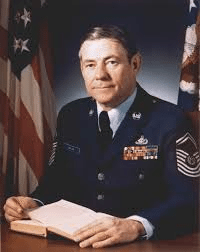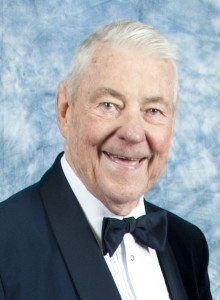 In this LeaderView™ Leadership Profile, we highlight intriguing leader: Chief Master Sergeant of the Air Force Robert D. Gaylor (retired). Our readers and staff nominated CMSAF Gaylor for this interview, which speaks highly of both his leadership and personality. After a successful 31-year career as adviser to Secretary of the Air Force John C. Stetson and Chiefs of Staff of the Air Force Gen. David C. Jones and Gen. Lew Allen Jr. on matters concerning welfare, effective utilization and progress of the enlisted members of the Air Force — the fifth chief master sergeant appointed to this ultimate noncommissioned officer position, CMSAF Gaylor served 16-years in the Leadership Department at USAA. We sat down to talk with CMSAF Gaylor about what makes him tick as a leader, and how we can learn from his leadership experiences to improve our own capacity for change. Even more exciting, CMSAF Gaylor has chosen to join our team of authors at #GeneralLeadership–so we expect some exciting stories in the very near future!
In this LeaderView™ Leadership Profile, we highlight intriguing leader: Chief Master Sergeant of the Air Force Robert D. Gaylor (retired). Our readers and staff nominated CMSAF Gaylor for this interview, which speaks highly of both his leadership and personality. After a successful 31-year career as adviser to Secretary of the Air Force John C. Stetson and Chiefs of Staff of the Air Force Gen. David C. Jones and Gen. Lew Allen Jr. on matters concerning welfare, effective utilization and progress of the enlisted members of the Air Force — the fifth chief master sergeant appointed to this ultimate noncommissioned officer position, CMSAF Gaylor served 16-years in the Leadership Department at USAA. We sat down to talk with CMSAF Gaylor about what makes him tick as a leader, and how we can learn from his leadership experiences to improve our own capacity for change. Even more exciting, CMSAF Gaylor has chosen to join our team of authors at #GeneralLeadership–so we expect some exciting stories in the very near future!
LeaderView™ Leadership Profile
Q1: CMSAF Gaylor, What has been your most notable leadership experience?
Numerous, 19 years as Security Police Supervisor, NCOIC Leadership Department, NCO Academy, Enlisted Advisor positions and, ultimately, Chief Master Sergeant of the Air Force.
Q2: That is quite a track record of success and challenging posts! What is the best leadership advice you were ever given?
Take care of your people (training and care) and they will take care of the mission!
Q3: Great advice! Who is your favorite leadership mentor or example?
The late General David Jones, former Chairman of the Joint Chiefs of Staff and US Air Force Chief of Staff and the late Brigadier General Bob McDermott, the CEO of USAA. Both were action leaders with God-given vision to prepare for future challenges while at the same time taking care of the people under their leadership.
Q4: We know that successful folks read. What are you reading these days and what is the best book you have ever read?
Recently, I have read the four “Killing…” books by Bill O’Reilly and “41” by George W. Bush. I have literally read hundreds of books in my lifetime, and it’s almost impossible to select the very best book I have ever read. That said, I was very moved by “Unbroken.”
Q5: What is your favorite question?
“Would you like some pizza?”
Seriously, though, “Are you willing to share your thoughts and experiences on effective leadership?” I love that question!
Q6: Why is a change mindset so important to successful leaders? How might the idea of change apply to young professionals making their way in the workplace today? How do you know you are effecting positive change?
In today’s present work environment, it does not take long for a firm to fall behind as the scene is very dynamic and ever changing. The word, “change,” frightens employees so the effective leader must know how to introduce, explain, and implement changes in a smooth and effective way. I have found that employees welcome change when they can see how it will benefit them personally and the firm for which they work. Change for the sake of change may confuse the workforce, so the young professionals of today must be taught the steps for effective change.
Q7: You have a wealth of experience and a highly successful track record. What advice would you give to the young professionals to make their way in this world?
Bring their education and experience to the workforce and–upon arrival–keep their eyes and ears open, with their mouth closed until they determine how they fit in and what contribution they will be able to make. They must know how to establish rapport with each person they interact with.
Q9: As we think about the concept of teamwork or unity, it feels like developing great teams is somewhat an art and there certainly is a fine line between good teams and great teams. How does great teamwork come about and what leadership attributes make this possible?
To me, the key to effective teamwork is the importance of expectation. When expectations are met, good things happen. When expectations are not met, frustrations occur. There must be an up-front, open discussion about the expectations from all players on the team until agreement is reached.
Q10: Why do you think some leaders fail at being a leader?
Their style is not appropriate within the work environment due to their inability to adapt and adjust to situational activities. Without the ability to analyze the ingredients of the work environment, failing leaders tend to play “Here comes my leadership whether it fits or not; if you don’t like it…duck!”
Q11: How do you think leaders and teammates can best receive value from sites like GeneralLeadership.com?
Sites like GeneralLeadership.com provide information that makes the reader “THINK.” I am convinced that I cannot tell someone how to react or behave. But, if I can plant a seed and encourage them to think about a particular technique, it may result in more appropriate leader behavior.
In Closing:
 Thank you, CMSAF Gaylor, for taking the time to share your thoughts, insights and advice with our readers and subscribers. We have all learned a lot about you, what makes you tick, and what inspires you as a leader. We are grateful for your time and, most importantly, your leadership! More than anything, we are happy to welcome you to the #GeneralLeadership author team–we, and our readers, look very forward to reading your stories and learning from your years of wisdom and experience!
Thank you, CMSAF Gaylor, for taking the time to share your thoughts, insights and advice with our readers and subscribers. We have all learned a lot about you, what makes you tick, and what inspires you as a leader. We are grateful for your time and, most importantly, your leadership! More than anything, we are happy to welcome you to the #GeneralLeadership author team–we, and our readers, look very forward to reading your stories and learning from your years of wisdom and experience!
